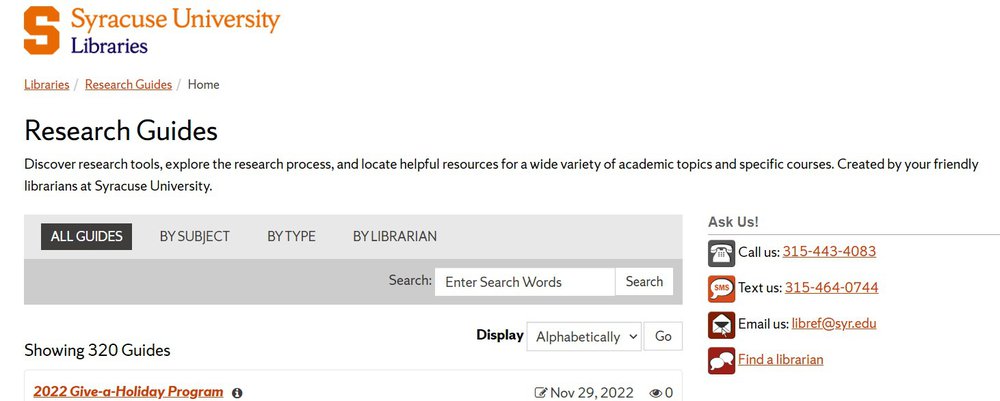New to Researching?

by Giovanna R. Colosi, Librarian for the School of Education
Tip #1 Refine your research topic
Choosing your topic is the first step in the research process. There may be times when the general topic is chosen for you, and other times you will have the flexibility to choose one of your liking. Either way it may not be an easy process. It must be narrow and unique enough to be interesting, yet broad enough for you to find sufficient information.
Begin researching with “broad” resources such as encyclopedias and Google to familiarize yourself with the subject more and better understand your topic.
Keep in mind certain things like the length of your paper, the number of citations required, and how much time you have to research.
Tip #2 Begin your search
Use the Syracuse Libraries website to locate books/eBooks, journals, periodicals, newspapers, and other types of media. We have several databases to help you with your search. You may also check with your school or college librarian’s research guide. These guides are curated by our librarians based on subject specific areas.
Tip #3 Carefully choose your search terms
- Keywords: Use the most precise words to define your topic including synonyms and alternate terms, such as abbreviations and scientific terms.
- Use controlled vocabulary: Database descriptors, the Library of Congress Subject Headings, or a thesaurus to help you find more words for your search.
- Use advanced search techniques:
- Truncation is used to expand results by instructing the computer to look for the root of the word and all alternate word endings. An * (asterisk) may substitute for any number of characters at the beginning, middle, or end of a word.
Example: Child* Retrieves child, child’s, childhood, children, etc.
- Boolean Operators: AND, OR, and NOT may be used to combine key words in database searching. Using Boolean operators can make your search more focused and generate more accurate results.
- Use AND to retrieve records containing only all search terms. AND will reduce and refine the results.
- Use OR to retrieve records containing one, both or all of the search terms. OR will expand the search and retrieve more results.
- Use NOT to exclude terms in a search. Be cautious when using NOT, useful search results may be omitted.
- Phrase Searching. Some databases and search engines will allow the use of “quotations” to search for an exact phrase or words together in a paragraph or sentence.
- Some databases have a “help” function. Utilize these when you get stuck.
Tip #4 Carefully and correctly cite your sources
- Take detailed notes, maintain a spreadsheet with pertinent information, or print out full references for bibliographies. Use a method of record keeping that is comfortable and easy for you.
- Cite all sources using the appropriate style, whether APA, MLA, etc.
- Consider using a citation management tool, like MENDELEY or ZOTERO.
Tip #5 Critically evaluate the information that you find
- Is the resource valuable, well written, up to date, and at an appropriate level for your need?
- If you need scholarly sources for your research, make sure resources are scholarly and peer evaluated.
- Remember not everything you read on the internet is factual. If you see something that seems fishy, check what site it came from. If you are still in doubt, ask a librarian!
Tip #6 Obtain help when you need it
- Use the Libraries 24/7 Chat feature.
- Ask a librarian for assistance.
- Finally, if you are on campus, come into one of our Libraries for assistance!
